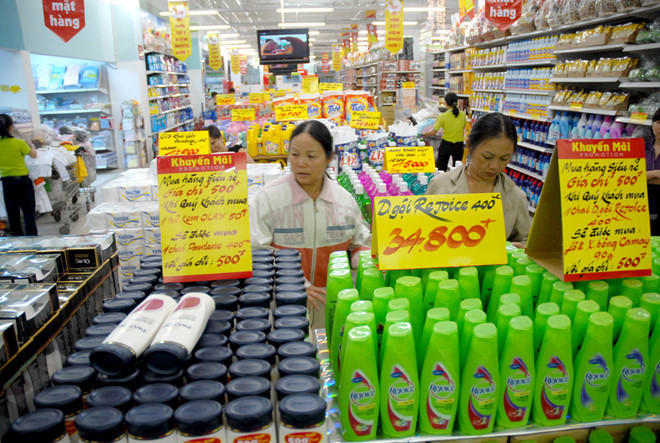Once dominating the domestic market, toothpaste brand Da Lan, after the sale to Colgate in 1995, officially disappeared from the market.

Two years later, when Unilever came to Vietnam, P/S, another famous toothpaste brand, was no longer Vietnamese.
More takeover deals occurred. Many Vietnamese enterprises developed their brands in the domestic market amid the presence of foreign players, but they finally had to sell to foreign partners.
Diana, which once held 30 percent of paper diapers and 40 percent of toilet paper market share, and led the woman- and baby-care product market, in 2011 sold 95 percent of shares to Unicharm from Japan for $184 million. With the deal, Diana officially became a foreign brand.
Also in 2011, X-Men, the shampoo product for men, was sold to Marico, a cosmetics group from India.
|
More takeover deals occurred. Many Vietnamese enterprises developed their brands in the domestic market amid the presence of foreign players, but they finally had to sell to foreign partners. |
In 2003, Pho 24 chain turned up in the domestic market. The owner of the brand, Ly Quy Trung, then stated that Pho 24 would become internationally known.
However, in 2011, the brand was transferred to Viet Thai Quoc Te, which owned Highlands Coffee which later transferred 50 percent of shares to Jollibee from the Philippines, putting an end to Trung’s dream of internationalizing Vietnamese traditional pho.
The sale of Sabeco, the best known Vietnamese beer brand, to Thai is the best known deal. In 2017, the Thai billionaire Charoen Sirivadhanabhakdi spent $5 billion to acquire 54 percent of Sabeco shares.
Prior to that, Carlsberg bought the capital contribution by Vietnamese partner in Huda Beer joint venture and turned it into a 100 percent foreign owned brewery. This was also the way Carlsberg acquired a controlling stake in many other brewers.
Vietnam is one of the top beer consumption markets in the world with 4 billion liters of beer consumed in 2016, representing a year-on-year increase of 6 percent. Beer consumption per capita is nearly 43 liters last year.
However, experts fear that tVietnam’s beer industry may be swallowed by foreigners. Habeco is undergoing the state’s divestment process, while sources said Carlsberg is coming closer to an agreement of acquiring more Habeco’s shares.
The same situation can be seen in the beverage sector. Tribeco, a brand well known to Saigonese, was swallowed by Uni-President. Halico, the Vietnamese biggest liquor producer, has also sold 45 percent of shares to Diageo from the UK, while Wonderfarm has fallen into the hands of Kirin Holdings from Japan.
RELATED NEWS
Once-famous brands struggle for revival
Go pottery, a brand of the Cham
Ha Dung
 Vietnamese businesses have been warned of being taken over by foreign conglomerates.
Vietnamese businesses have been warned of being taken over by foreign conglomerates.